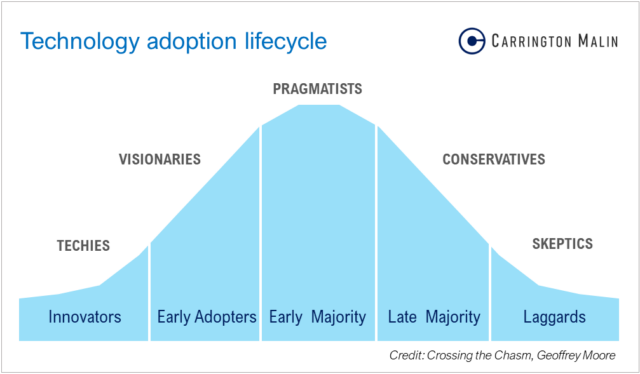
|
|
Without methodically planning your sales and marketing, you are just as methodically planning to fail. Yes, even if you’re just an early stage venture with little budget.
I’ve talked to dozens of AI startup founders over the past few years. All of them passionate about their technology. All obsessed with what their technology can do for customers. Most, fortunate enough to have one or two customers that are innovation leaders and have helped them develop their proof of concepts. And, sadly, most of them seem to think that sales and marketing is not a priority. They often think that its something that new ventures don’t need to make a priority of, or perhaps only once they have more funding than they need for product development. They are wrong.
Before I provide you with an explanation. Let me begin by saying that I don’t blame tech founders for not prioritising sales and marketing. I’ve worked in sales and marketing for my whole career and the fundamentals are obvious to me mainly because of that. I can’t code, I don’t know how to build tech products. So, it’s hardly a surprise to me that sales and marketing is not the strong suit for many highly educated, experienced and talented technology developers. Why would it be?
If sales and marketing were both limited to outreach without strategy, both would be highly inefficient and unproductive.
In my experience, coders, software developers and system engineers tend to associate sales and marketing with what they see. Sales might seem like its all about salespeople getting out there and meeting people. So, human resource and a lot of talking!
Meanwhile, the most visible output from marketing is content. I’ve met many technical people that confuse creativity and creative content with marketing. They think marketing is advertisements, website copy and social media posts. So, therefore, in their minds, it’s a creative endeavour.
Now, of course those assumptions are mostly true. However, if sales and marketing were both limited to outreach without strategy, both would be highly inefficient and unproductive. If a you want a vehicle to travel from from point A to point B, it needs a steering wheel, to chart a course, and someone who can oversee the journey, direct actions, maintain the course and accomplish the goals of the trip.
Taking your message to people every day is the lifeblood of sales. But, it has to be the right message and you need to be talking to the right people. Sales requires a strategy that externalises your company proposition, product benefits and your vision effectively. Sales must also position your product appropriately against the alternatives, create a dialogue with customers that identifies needs, and present your product as the best-fit solution for the customer.
Likewise, much of the ongoing effort in a marketing department is spent on developing and running campaigns, and so that does include creative work and content. As with sales success, marketing is dependent on taking the right message to the right people. Marketing also plays a key role in defining and positioning your product in the terms that the market will understand, taking care to position it as relevant in the market context, and taking steps to help create a better environment to sell it in.
Common misconceptions often shape new ventures’ first investments in sales and marketing.
Common misconceptions often shape new ventures’ first investments in sales and marketing.
If you believe that sales is talking to people and the main goal is to talk to more people, perhaps young, energetic sales executives with good communications skills, are a good hire. But these sales hires will not help you with aligning the sales proposition, presentations, targeting and pricing of your product in context of the market.
If you believe that marketing’s job is to make noise and give you more visibility, then you may opt for young hires that know how to post on social media, write media content and organise events. But these hires will not help you with developing a robust strategy that aligns with market segments, ideal customer profiles, competitor pricing and your product vision.
In big global companies the research, strategy and definition is often managed by different teams, to the implementation and tactics. This highlights another problem, which is the availability of those skill sets in your region. Often big US or European tech leaders hold that expertise at their head offices: everything else around the world is mostly execution. So, hiring someone from such firms isn’t necessarily a solution, if their main expertise is effective execution of corporate strategy.
It is not a question of scale or maturity. It is a matter of measure.
Although expertise and experience usually play a key role in shaping sales and marketing, sales is not dependent on salespeople, and marketing is not dependent on having a marketing team, or a big advertising budget. It is not a question of scale or maturity. It is a matter of measure.
Every tech venture should have a written sales and marketing strategy. Depending on the sector, product and stage of the business, this could be a few slides, a single document of just a few pages, or a comprehensive set of plans, budgets, research, roadmaps and schedules. The role of such plans are to inform your day-to-day activities, whilst helping you plan and position your business for the future.
So, why do need to be this methodical, if you only have a small team with a limited sales capability and/or marketing budget?
1 – Many founders are great visionaries, but poor salespeople!
I’ve met many founders that can hold forth for hours on their product, the technology market and their vision for how technology will change the world. Invariably, this impresses other techies, but their pitch is often not focused on what their product brings customers now, or why it meets customer needs today. Founders can prove to be the best salesmen in the company, but what they say to whom, needs to be clearly defined (and practiced).
2 – Founders who are great salespeople, must often close every single sale!
There’s no doubt, most founders get better at selling as they grow their business. They get used to the things that customers ask and enjoy giving them chapter and verse on how the product was developed to meet their challenges. The problem with this is that, often, even long after multiple salespeople have been onboarded, the only person in the company who can close a sale, is the founder (because no one else has an effective sales story to tell!). Furthermore, it maybe the case that the founder can only do this with a customer that is an innovation leader and so is maybe more inclined to listen to the founder’s life story, in order to understand what the product does. Most customers won’t really want to do this.

3 – Early stage customers are often innovation leaders, that changes!
A tech venture’s first customers are often innovation leaders, these appear at the beginning of the technology adoption lifecycle. These are the organisations focused on innovation, with tech-savvy specialists and decision makers that are prepared to take risks in order to embrace innovation. Although ideal for ventures with new technology to develop and sell, these customers can prove to be few and far between. Just because you have found a customer that is very focused on your technological advantages and is happy to discuss them for hours, it doesn’t follow that the customer’s counterparts in other companies are similarly disposed. Most customers require that you make it easy for them to see understand benefits, win internal support, justify the purchase and buy.
4 – When you’re a new or fast-growing business, everyone should be selling!
We all need to be in sales. When you’re a small business everyone in the company needs to be equipped to help spread the word, position your business in the market and sell your product. That’s how you can ‘punch above your weight’, begin building a reputation in the wider market and also become a sought after employer. To do this, you will need to have developed a powerful story that everyone can tell (i.e. not just the founders). This is where sales and marketing meets human resources. What you do, how you sell and who your product helps, should be ingrained in your organisation.
The first step in meeting all four of these challenges, is to distill what it is that you are selling down to simple plans, goals, messages and proof points. It is also important to develop a strategy to take this to market, in context of the market environment, competition, prevalent pricing, customer pain points, and the vision for your product.
A technology venture that can build a sustainable, growing business on product development alone, is a very rare animal. Your business only becomes a leader when everyone else says it is. So, first you need an effective strategy to reach and convince the right customers, partners, opinion formers and opinion leaders, whilst growing your revenue. Big budget, small budget, or no budget, that’s what sales and marketing is for.
Image: Microsoft Ventures Seattle Accelerator (Credit: Microsoft)
by Carrington Malin
Carrington Malin is a UAE-based marketing and communications professional, consultant, entrepreneur and writer with many years experience of building brands, driving growth and leading high-performance teams. He has worked with a wide range of high-growth, technology and tech-driven ventures across ecommerce, consumer products, digital services, B2B, media, software, hardware and other sectors. These days he focuses mainly on emerging technology ventures related to artificial intelligence (AI), augmented reality (AR) / virtual reality (VR), blockchain, drones, Internet of Things (IoT), robotics and smart cities.

